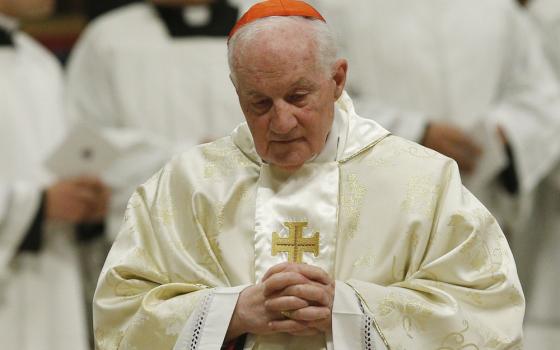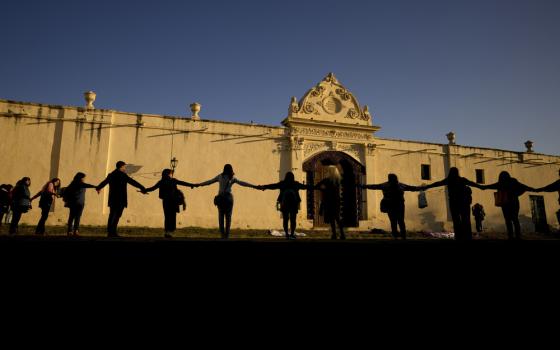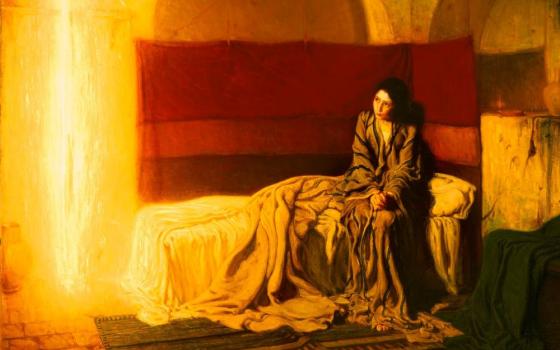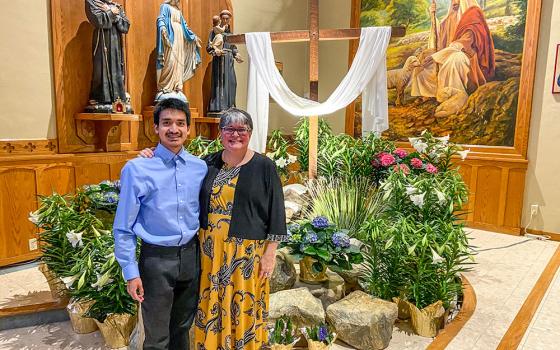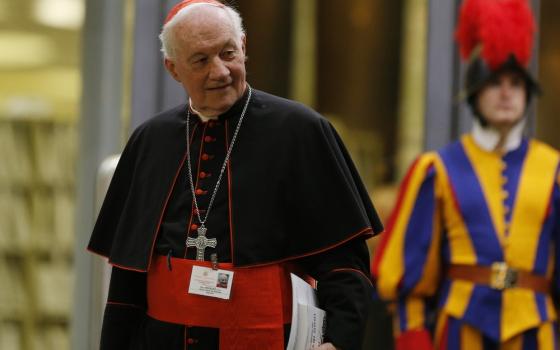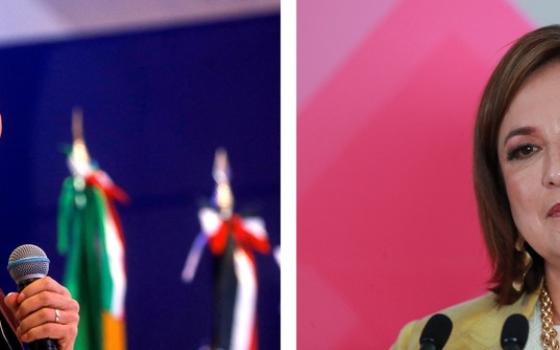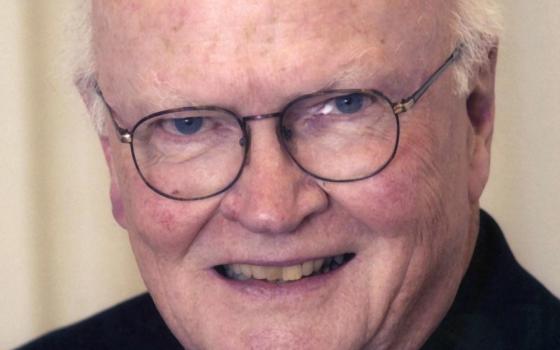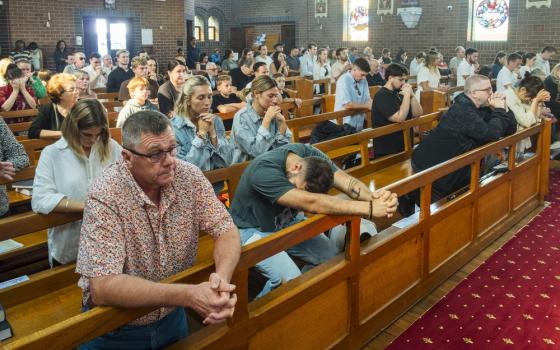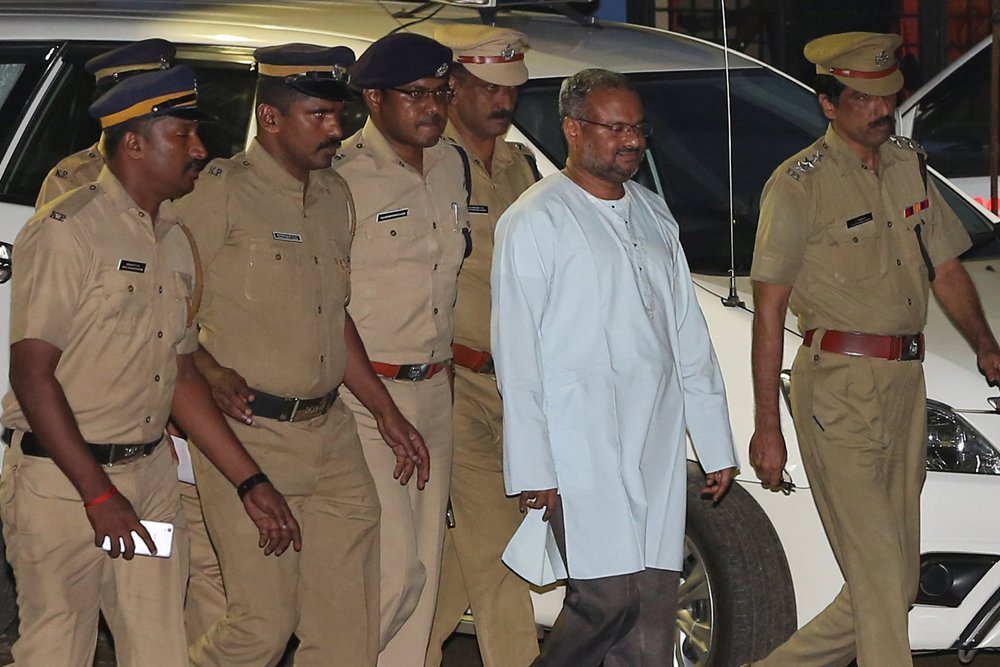
Bishop Franco Mulakkal of Jalandhar, India, is led away for questioning by police Sept. 21, 2018. on the outskirts of Cochin. A state court in southern India has denied bail to Bishop Mulakkal who is accused of raping a nun on grounds that he could influence witnesses if released from jail. (CNS photo / Sivaram V, Reuters)
The case of a Catholic bishop in India charged with repeatedly raping a nun took a major procedural step forward last month when it was transferred from a local court to a higher court for trial. No trial date has been set.
The charges against Bishop Franco Mulakkal of Jalandhar in the rapes of a former superior general of the Missionaries of Jesus have sparked media attention around the world. The response has rekindled coverage about sisters being abused by clergy, prompted women religious organizations to decry the abuse of sisters and call for clear reporting protocols by the Vatican, and divided India's Catholic Church.
Flying home on the papal plane in February, Pope Francis acknowledged that sexual abuse of sisters by priests and even bishops is a persistent problem in the church.
Mulakkal, the first bishop in India to be charged with sexual assault, has denied the allegations and is free on bail.
The case's advance to trial in India's complex judicial system heartened supporters of the victim and came just ahead of the first anniversary of the unprecedented protest by a group of nuns demanding the bishop's arrest.
"No doubt [the lower court order] is a matter of joy for all of us," says Sr. Anupama Kelamangalathuveli, the spokesperson of the five Missionaries of Jesus sisters, who, with the support of lay groups, staged the protest in Kochi, Kerala's legal capital, demanding justice for their former superior general.
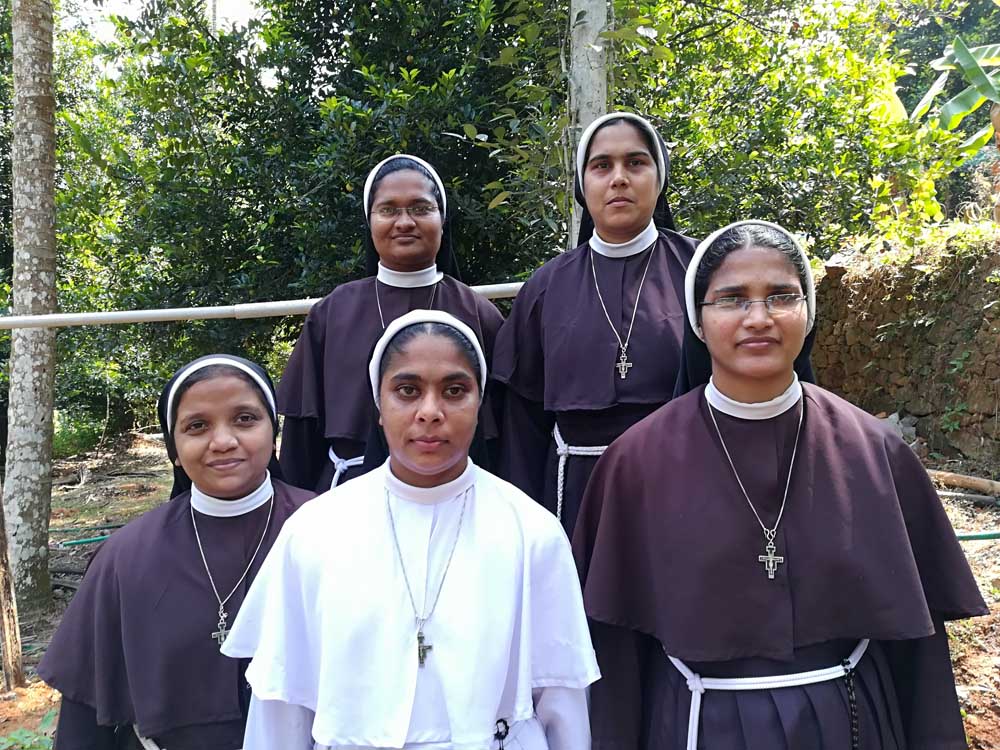
Five Missionaries of Jesus sisters protested the alleged rape of their former superior by a bishop at their Kuravilangad convent in Kerala. Front row, from left, are Josephine Villoonnickal, Ancitta Urumbil and Neena Rose. Second row, from left, are Anupama Kelamangalathuveli and Alphy Pallasseril. (Saji Thomas)
Mulakkal had stepped down from his duties as head of the Jalandhar Diocese a year ago. Kelamangalathuveli told Global Sisters Report that they are "hopeful that the trial will start soon." If convicted, the bishop faces a prison term of 10 years to life.
The case has created intensive strain on the church in India, a country that is 80% Hindu. Some Catholics are rallying around a bishop to protect him from an attack they see as undermining church authority. (More than 1,500 sisters gathered this week to decry media attacks they say have damaged the image of religious life.) Others view it as India's #MeToo moment – a time to call out a moral wrong – even if a bishop is involved.
This case and other controversies surrounding priests and nuns have damaged the church's image in India, says Fr. Vinod Kanatt, pastor of St. Ann's Church in Junagadh, Gujarat state, western India.
"The church cannot avoid criticism. It should take criticism as an opportunity to introspect and correct its ways, if needed," the Carmelite of Mary Immaculate priest told GSR.
Kanatt says the church should not worry about increasing its members or institutions, but help its people remain holy and maintain transparency in its dealings.
"Our model is a crucified Christ who even pardoned his killers. Jesus is our inspiration and icon," he says.
The case that rocked a church
The case began on June 28, 2018, when the survivor filed a complaint at the local police station, accusing Mulakkal of raping her more than a dozen times between 2014 and 2016 at the congregation's convent in Kuravilangad, near Palai. At the time of the attacks, the sister was the convent superior.
Mulakkal, 55, maintains that the case is the survivor's vendetta against him for initiating disciplinary proceedings against her for an alleged affair with the husband of one of her nieces.
The Missionaries of Jesus is a congregation under the Jalandhar Diocese, and Mulakkal was its patron until he was replaced by Rome a year ago to deal with his case. After police questioning, he was arrested on Sept. 21, 2018.
By then the protest by Kelamangalathuveli and her companions had become a public movement bringing people from all religions and social organizations to the streets of Kerala to seek justice for the survivor. The protest ended the day after the arrest.
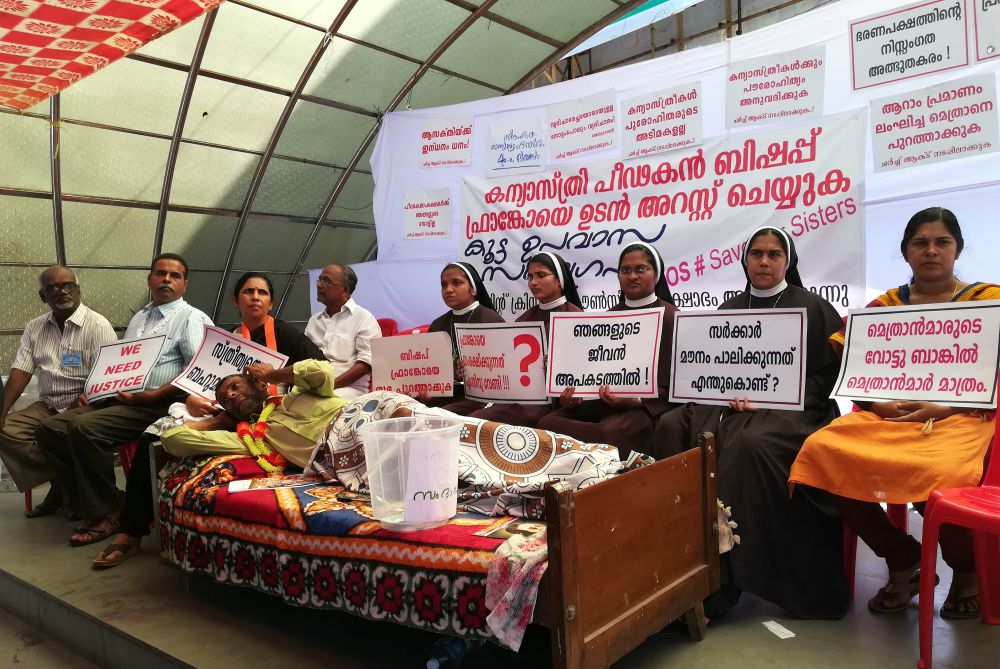
Stephen Mathew, on cot, is on an indefinite hunger strike while nuns from the Missionaries of Jesus stage an indefinite sit-in near the High Court of Kochi, commercial hub of southwestern Indian state of Kerala, in September 2018. (Saji Thomas)
A few weeks later, an appellate court granted Mulakkal bail, and he returned to Jalandhar, 1,960 miles north of Palai, to a hero's welcome.
The case entered a new stage in April when the investigation team submitted a charge sheet of more than 2,000 pages to the Palai court. The team accused Mulakkal of committing offenses such as wrongful confinement, rape of a woman incapable of giving consent, causing grievous bodily harm during rape, unnatural offense (or sodomy), and criminal intimidation.
The charge sheet has listed 83 witnesses, including Cardinal George Alencherry, head of the Syro-Malabar Church, an Eastern Catholic rite. Alencherry was the first church official the survivor approached for help, Kelamangalathuveli said.
The survivor had also met Bishops Joseph Kallarangatt of Palai, Kurian Valiakandathil of Bhagalpur and Sebastian Vadakkel of Ujjain, who are witnesses along with 25 nuns and 13 priests.
Ordeals in the wake of arrest
Kelamangalathuveli, one of the witnesses, says she and her companions, who stay with the survivor in the Kuravilangad convent, have faced several ordeals in their quest for justice.
"Some supporters of the bishop have not missed any occasion to humiliate us. Even our confidential records in our superiors' possession were brought to a television discussion where they called us prostitutes," she bemoans.
The nun, who has braved threats and enticements to back off from the case, accuses the Indian church leaders of supporting Mulakkal "covertly and overtly" while questioning the credibility of the survivor.
Kelamangalathuveli and the protesting sisters disclosed a recorded telephone conversation they had with Carmelites of Mary Immaculate Fr. James Erthayil, who had offered them 10 acres (4.05 hectares) of land and other incentives to withdraw the case.
The police registered a case against the priest for trying to influence witnesses, according to an investigative report they submitted to the Palai court on March 13.
"We fear for our lives as they can do anything to win the case," says Sr. Alphy Pallasseril, one of the protesters.
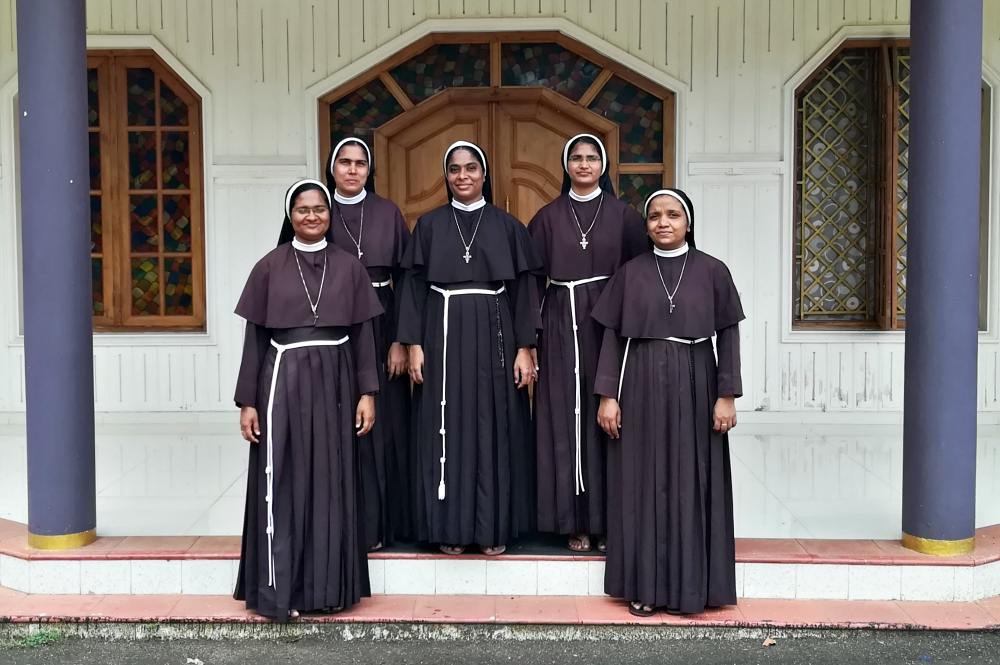
The five Members of the Missionaries of Jesus who in September 2018 staged a sit-in in Kochi, Kerala, India, to demand the arrest of a bishop accused of rape. From left are Sisters Anupama, Alphy, Ancitta, Neena Rose and Josephine, standing in front of their convent chapel at Kuravilangad. (Saji Thomas)
The Kerala government has deployed one female and two male police constables at the Kuravilangad convent to give round-the-clock security cover to the five nuns and the survivor. The police personnel accompany them wherever they go.
"Obviously, we have police security, but we still need to be careful until we record our statement in the trial court," Pallasseril told GSR, in reference to the mysterious death of Fr. Kuriakose Kattuthara, a Jalandhar diocesan priest who had given statements against Mulakkal to media and police.
The 61-year-old priest was found dead inside his room at St. Mary's Church complex in Dasuya town near Jalandhar on Oct. 22, 2018, a week after Mulakkal's release and return to the Jalandhar diocese.
Although autopsy reports ruled out foul play in the priest's death, people close to him say he was under great mental strain after Mulakkal was freed on bail.
Kelamangalathuveli alleges that the brother of a Jalandhar diocesan priest in Kerala had bribed a boy working in their convent to loosen the brake cable of a scooter the five nuns use. "It was an attempt to kill some of us," she said, adding that someone knowledgeable about the plot later warned the sisters.
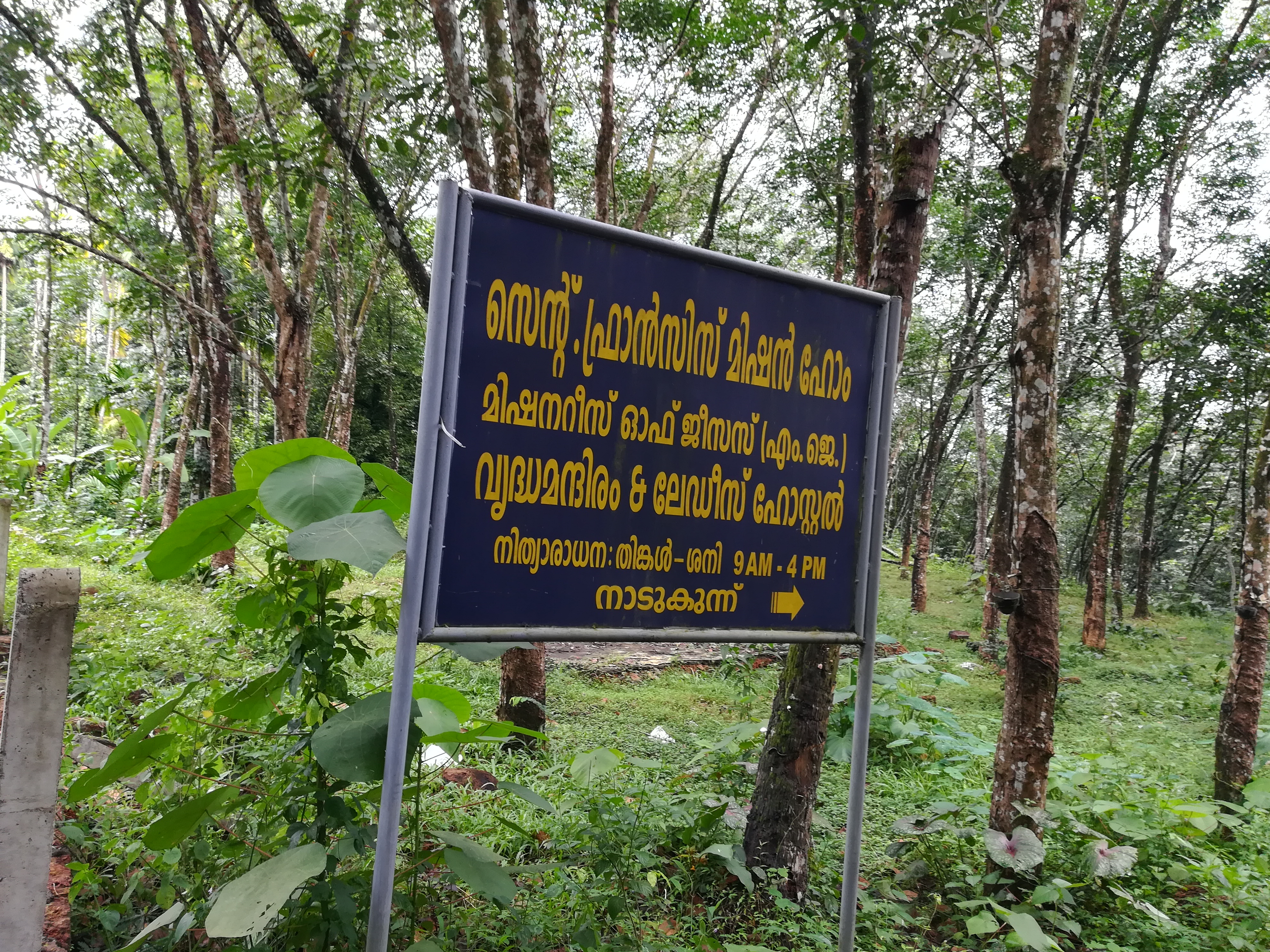
A sign points the way toward the St. Francis Mission Home at the convent of the Missionaries of Jesus at Kuravilangad in the Kottayam district of Kerala, India. A sister lives under police protection there as she awaits the trial of a bishop accused of raping her multiple times at the convent. (Saji Thomas)
She says that they face ill treatment from within the congregation as well as the church at large. The Palai Diocese has removed the convent's name from its website and the local parish has dropped the sisters from its parishioners' list. The parish has nine priests but none comes to their convent to offer Mass.
"A missionary priest out of compassion offers Mass in our convent on Sundays," Kelamangalathuveli says.
Pallasseril says they have been completely isolated from the official church circles and "in our congregation, but we fight our battle with the support from right-minded civil society."
Sr. Anit Kuvalloor, their new superior general, denied that the protesting nuns have been treated badly. "It is not true. They are all finally professed members of the congregation."
The superior general says she wants the trial completed soon so they can learn the truth. "We will be able to know the truth only after the court pronounces its verdict after the trial," she told GSR. "We don't know who is right and who is wrong," she added.
Some fear that the accused bishop's lawyers and supporters would try to delay the trial and sabotage the case after their failure to influence witnesses.
"The case is a do-or-die battle for the accused bishop and the Catholic Church leaders in India," says Shaiju Antony, now joint convener of Save Our Sisters, a laity movement involved in the sit-in since last year.
He says, given the vehicle tampering and priest's death, Kelamangalathuveli and her companions have to be extremely vigilant about their safety. "They also have to be prepared for grueling questioning during the trial."
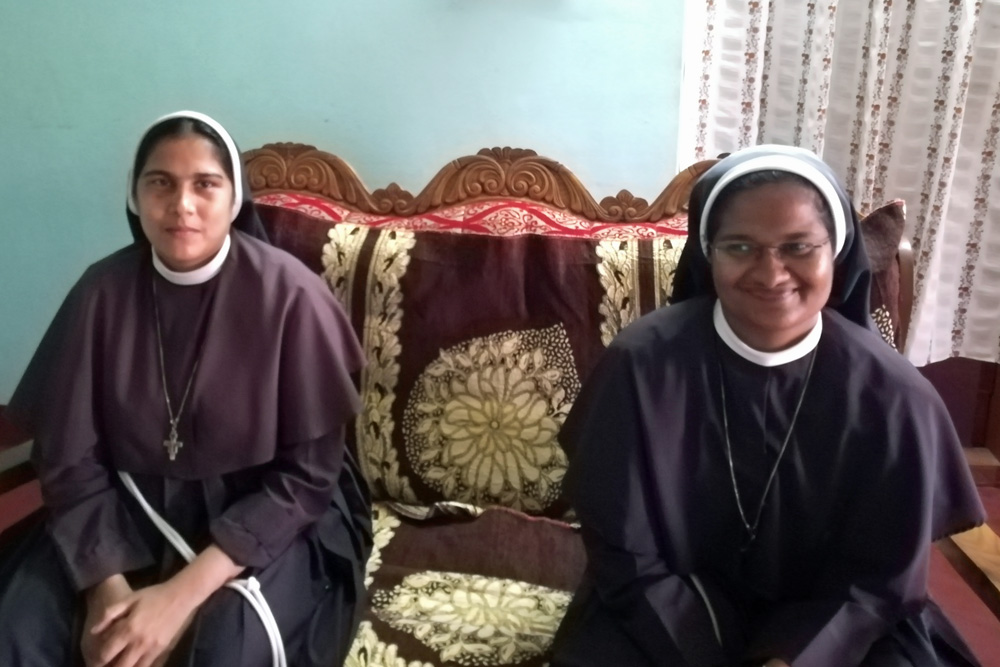
Srs. Alphy Pallasseril and Anupama Kelamangalathuveli, inside the visitors' room of St. Francis Mission Home, the convent of Missionaries of Jesus at Kuravilangad in the Kottayam district of Kerala, India. The sisters were among the group of five who demanded a bishop's arrest in a public sit-in a year ago. (Saji Thomas)
A series of delays
Antony says the case has languished in the Palai court due to delaying tactics by the bishop's legal team. They tried to manipulate the digitally recorded evidence to weaken the case, he alleges.
A copy of a DVD with electronic evidence, meant for the defense team, was sent for forensic examination and was somehow altered. When Mulakkal's lawyer asked the Palai court to verify the copy, the magistrate became suspicious. He crosschecked the copy with the original in his possession and found that a folder was missing.
Antony suspects someone had manipulated the government lab. If the judge had not checked the DVD, Mulakkal's team would have questioned the veracity of the original in the court's custody. The discrepancy would have led to the dismissal of the DVD, a crucial piece of evidence in the exhibits.
Antony says the case is still alive because of the "proactive and vigilant stand taken by the public, who are not swayed by the false propaganda of Mulakkal supporters among the church leaders."
The police filed the charge sheet only after Save Our Sisters and the protesting nuns had threatened to stage another public protest, Antony claims.
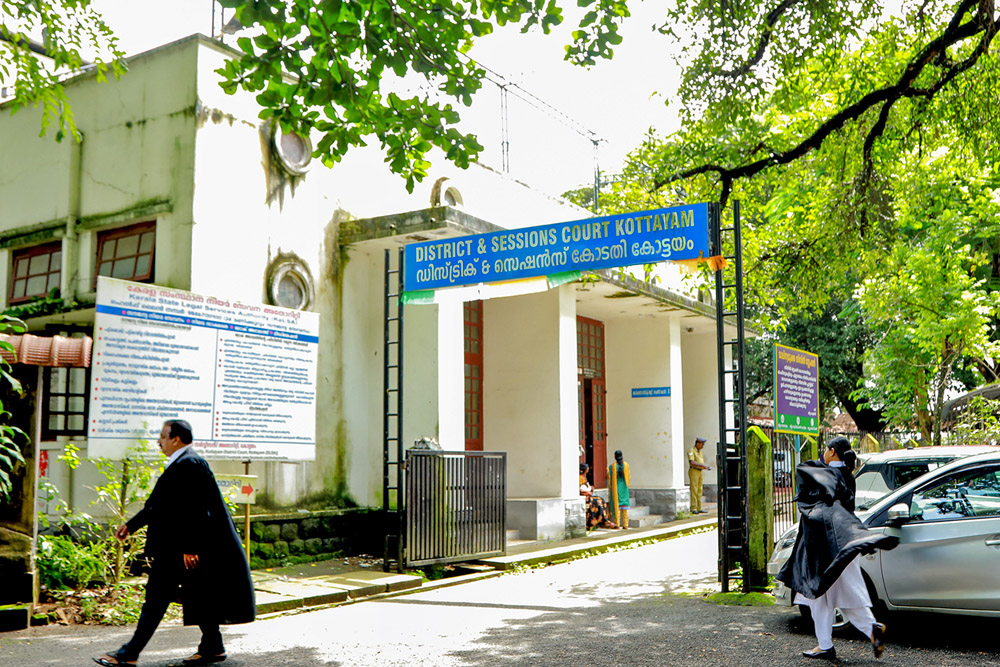
The District and Sessions Court of Kottayam, where Bishop Franco Mulakkal was acquitted on Jan. 14, 2022 (Saji Thomas)
Church pressure on religious
The church has also acted against other nuns and priests who support the survivor, Antony says.
On Aug. 7, the Franciscan Clarist Congregation dismissed one of its members, Sr. Lucy Kalappura, accusing her of violating vows of poverty and obedience. However, the 54-year-old nun alleges that the congregation acted against her after she joined Kelamangalathuveli and others in last year's protest.
The 130-year-old indigenous congregation also took disciplinary action against Sr. Lissy Vadakkel, another witness in the case. She had given police statements against Mulakkal without her superior's permission.
While Kalappura fights her dismissal in an appeal to the Vatican, Vadakkel lives in their convent in Muvattupuzha, a town between Palai and Kochi, under the care of two police constables. She was the first person to get police protection under a new Supreme Court order for the safety of witnesses in cases where their lives are threatened.
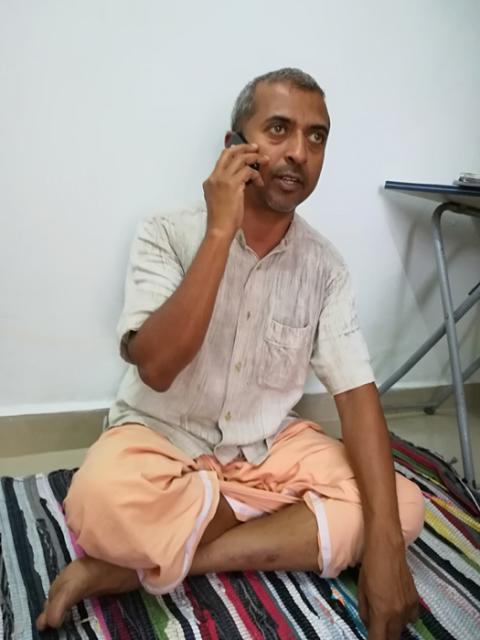
Activist priest Fr. Augustine Vattoly of the Ernakulam-Angamaly Archdiocese speaks on his cellphone at his residence on the outskirts of Kochi, Kerala. The priest has been an avid supporter of the Catholic sister accusing a bishop of repeatedly raping her at her Kerala convent. (Saji Thomas)
Another person to incur the church's wrath is Fr. Augustine Vattoly, a priest of the Ernakulam-Angamaly Archdiocese and the first SOS convener. The archdiocese forced him to quit the post and ordered him to dissociate completely from the movement.
Vattoly hails the nuns' protest last year as an unprecedented event in the Indian church's history. He finds it ironic that the Indian church leaders target the nuns who were forced to go to the street for justice while protecting a bishop accused of rape.
"It goes against Pope Francis' stand that even if one among 100 commits sexual abuse or any such acts, he should not be protected."
The Catholic Bishops' Conference of India and its Kerala unit have stated that they would wait for the law to take its course.
Mulakkal's team declined to comment for this story.
"I am a witness in the case and if I speak anything it will go against me," said Fr. Peter Kavumpuram, public relations officer for the Jalandhar Diocese.
Vattoly says the Indian church leaders could have found in the nuns' protest lessons for its future and survival.
"Unfortunately, they hunt prophets and smother their prophesies," said the priest, who lives in a one-room hut in a shanty town in Kochi.
[Saji Thomas is a freelance journalist based in Bhopal, a central Indian city. He has worked for several mainstream newspapers such as The Times of India. This article is part of a collaboration between GSR and Matters India, a news portal that focuses on religious and social issues in India.]
Advertisement

